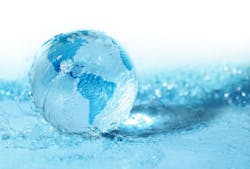Study highlights environmental and health benefits of recycled water
LOS ANGELES — March 17, 2016 — More widespread use of recycled water in California would bring benefits for the environment and human health, according to a new study published online in the American Journal of Public Health.
Researchers at the UCLA Fielding School of Public Health compared California’s current water conservation efforts with two other options: banning landscape irrigation and expanding the use of alternative water sources, such as desalination and recycled water.
They found that reusing more wastewater would have the greatest potential to reduce water and energy use and lower greenhouse gas emissions. It would also improve the overall resiliency of the water supply and benefit public health, for example by improving municipalities’ ability to maintain green spaces, which can lead to cleaner air, thus reducing the occurrence of respiratory disease. Green spaces also help people be active, reducing obesity and cardiovascular disease.
Although municipal bans on landscape irrigation have helped conserve water and energy, they can end up depleting urban green spaces.
“Expansion of recycled water use has a tremendous potential to positively impact health,” explained Hilary Godwin, a co-author of the study and a UCLA professor of environmental health sciences. “Recycled water is often perceived to be dirty or unhealthful, or associated with the moniker ‘toilet to tap.’ Our research helps change this conversation.”
At present, around 52 percent of California’s water is used for irrigation. In some parts of the state, recycled water is used to irrigate golf courses and green spaces, but most urban areas don’t have the infrastructure to recycle water for large-scale irrigation projects.
When the researchers analyzed water desalination, they found that the technique uses 50 percent more energy than importing water, and is 120 times more energy-intensive than getting water from the Los Angeles Aqueduct, which is gravity-powered.
Brian Cole, adjunct assistant professor of environmental health sciences at the Fielding School and a senior author of the study, said that water systems around the world could expand the use of recycled water.
“The hope is that this research might inspire communities to consider increasing recycled water use because of the potential to have a positive impact on public health,” he said.
